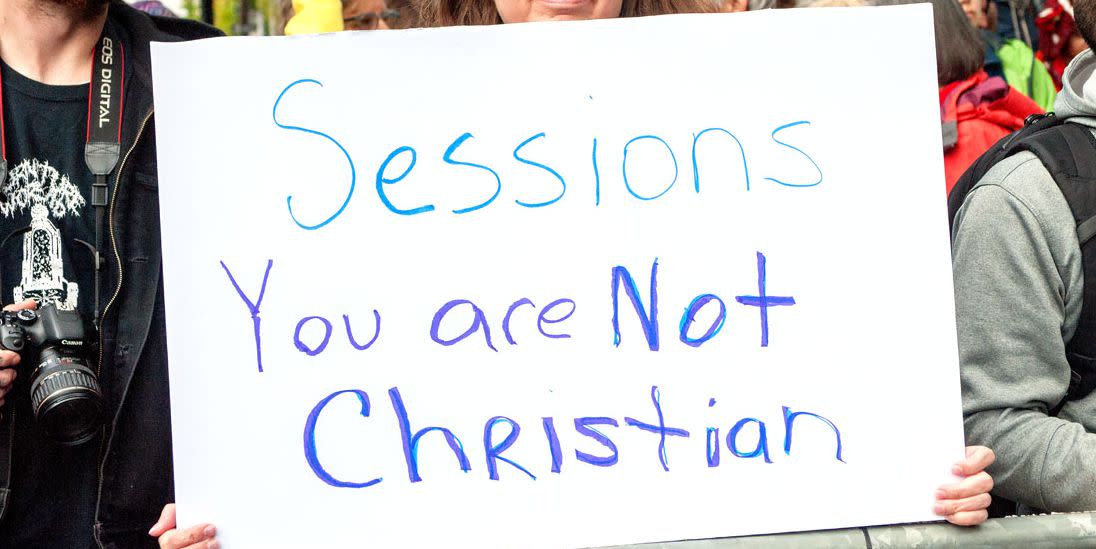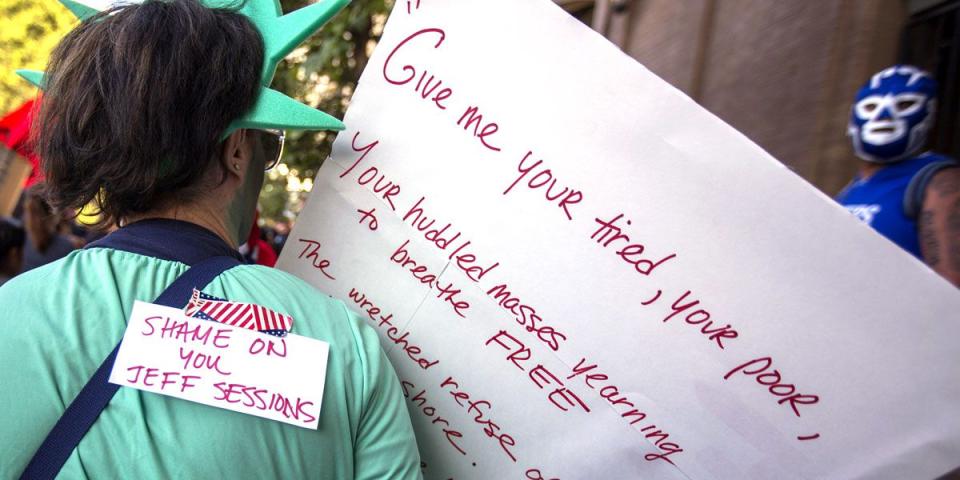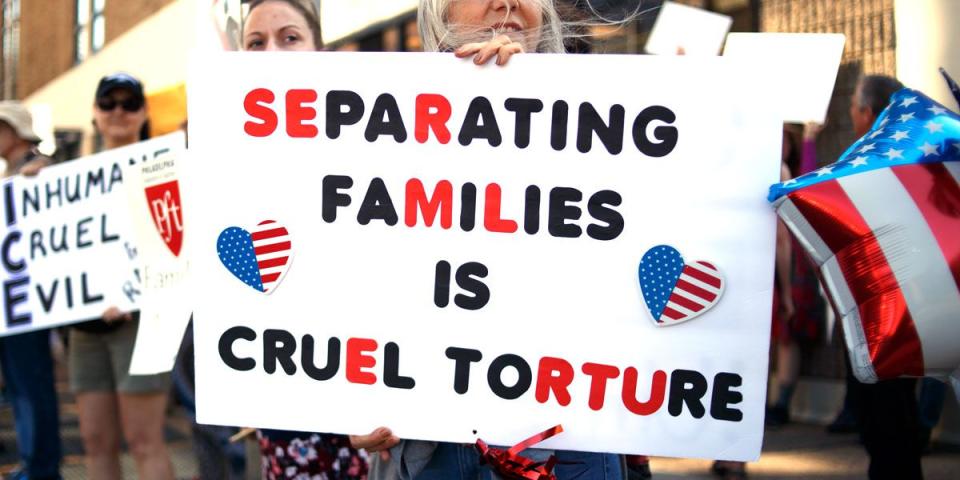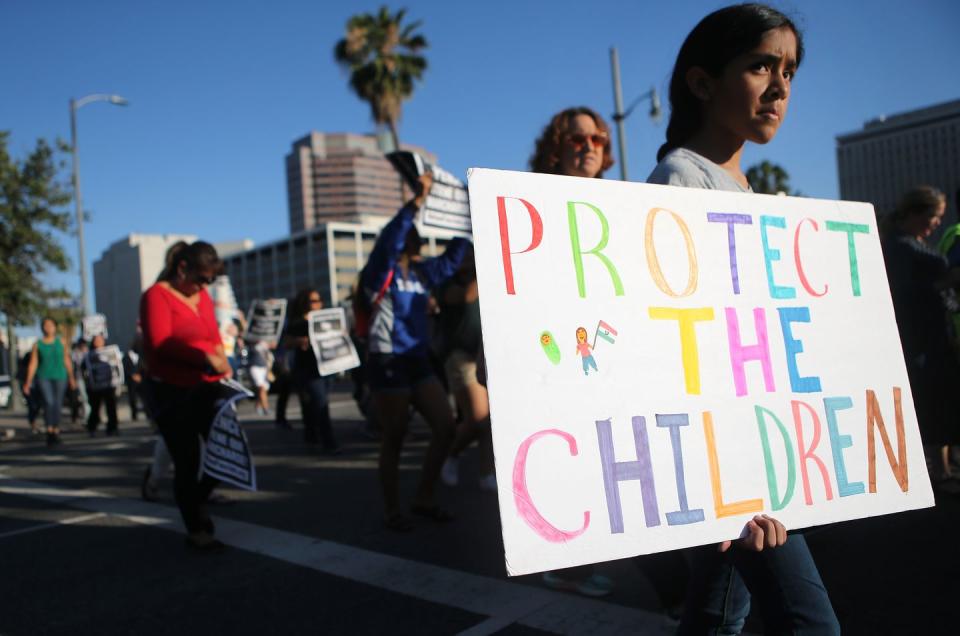I Do Not Worship the Same God as Jeff Sessions

When Attorney General Jeff Sessions used the Bible last week to justify the horrendous and vile practice of separating children from their parents at the border, he signaled a new low in contemporary American politics of using religious doctrine to justify doing harm to children. Actually, this isn’t a new low. The Bible has long been used as the foundational holy text of white supremacist doctrine in this country. Slave masters preached a Christianity to black enslaved people that included Scriptures like “servants, in reverent fear of God submit yourselves to your masters, not only to those who are good and considerate, but also to those who are harsh” (1 Peter 2:18).
Sessions invoked Romans chapter 13 to reinforce the sanctity of the rule of law. In doing so, he reminded us that very often what is legal in America flies in the face of what is considered moral everywhere. Slavery was evil. Segregation was evil. Separating children from their parents is evil. And the Bible has been used by American policies to justify each and every practice.
A Christianity that condones any of these practices has no moral authority whatsoever.
According to a recently released study from researchers at the University of North Carolina, most American Christians, regardless of race, think that God is a white man. This is still true in 2018. This kind of religious identity politics matters, because it means that most adherents to America’s most prominent religion believe that God looks and acts in ways that favor the needs and perspectives of white men.
Jeff Sessions, a Methodist who has long enjoyed the political support of white evangelicals, speaks with the kind of confidence that comes from believing that God looks, acts, and thinks just like him. Jeff Sessions’s God is a white supremacist. And Sessions is not alone in this. He and so many in his political base subscribe to a Christianity that works from the assumption that white people are supposed to be on top, that it is God’s will that white people have the best of everything, at the expense of everyone else. These Christians believe that to be a white American is to have achieved the pinnacle and quintessence of God’s kingdom. This is such a bankrupt and moribund view of what religion should be.
Seventy-six percent of evangelical Protestants are white. And lest we forget that more than 80 percent of white evangelicals voted for Trump, even after campaign in which he spewed racist rhetoric and stood accused of sexual harassment and assault by more than a dozen women. Likewise, 80 percent of white evangelicals voted for a Bible-toting, Scripture-quoting, alleged pedophile named Roy Moore in last year’s Alabama Senate race.
Last year, 65 percent of white evangelical Protestants said a business owner who provides wedding services, like cakes or flowers, should be allowed to refuse those services to same-sex couples if it violates their religious beliefs. And they support Jeff Sessions, a man who has tried to reduce both legal and illegal immigration and whose efforts to disenfranchise black voters were so egregious that Coretta Scott King, wife of Dr. Martin Luther King Jr., railed against him being appointed to a federal judgeship during the Reagan administration.
Essentially, white evangelical policy positions have abdicated any credible assertion of a belief in equality, freedom, or justice for anyone who is not a white heterosexual man.

I am a Christian, but my God is not a white man. Jesus was a brown-skinned Jew. To the extent that God is spirit, my spiritual picture isn’t a white man either. Precisely because I don’t think God is white, I don’t expect God to think and act in ways that privilege or applaud the machinations of whiteness or white supremacy.
I grew up in a fairly conservative Black Baptist church in the Deep South. I am a preacher’s kid, and I remain, despite many, many reservations, a practicing Christian. Christianity is not monolithic. I count some white conservative Christians as friends, and I have been blessed by the work of white progressive Christians. I can appreciate the attempts to move forward among traditionally white Christian institutions like the Southern Baptist Convention, who have seen the error in their ways.
This week the United Methodist Church has brought charges accusing Sessions of child abuse in his efforts to separate kids from their parents and keeping them in mass incarceration facilities, immorality, racial discrimination, and “dissemination of doctrines contrary to the established standards of doctrines.” Other white evangelicals have criticized him for his invocation of the bible verse as well as his immigration policy. This collective outrage gives me hope.
In every era, there have been white Christians who have fought against the project of white supremacy. But as recently as April, white evangelical support of Trump was at an all-time high, with 75 percent of white evangelicals in a recent survey saying they have a favorable view of the president. Thus, this is not simply the case of one individual religious conservative gone rogue. We have arrived at this moment because of decades of political organizing among religious conservatives to link religious values to the most harmful kinds of social policy on the right–everything from curtailing abortion rights to supporting segregated schools.
Now is the time for progressive white Christians to stand up and fight back. It cannot simply be up to Christians of color to point out the evils of the Trump-Sessions regime.
I feel sure that though we both call ourselves Christians, I do not worship the same God as Jeff Sessions, or any Christian-identified person who believes that it is holy or righteous to separate families, take nursing children from their mothers, or lock children in detention centers as a matter of political showmanship.
This limited worldview is why so many people who call themselves Christians can look around at the deep inequalities that shape American life and see those injustices as being ordained by God. More than that, it is why these powerful men can use the American legislative apparatus to create deep social inequality. They think this is what the Bible tells them to do. But if this is what the Bible says, let’s throw the whole thing away.
To be clear, I’m pretty versed in what the Bible says. What I have learned, though, is that trying to fight Scripture with Scripture never gets us anywhere. I can point to copious Scriptures about the importance of loving one’s neighbor, not harming children, and treating strangers with justice and kindness. The Bible is replete with such commands. The Bible also justifies ethnic cleansing and genocide in order for Israelites to have their promised land, and it argues in multiple places that women are to be subordinate to men.
We can only arrive at better theology when people act in good faith. When folks like Sessions blatantly misuse the Bible to justify oppression, this is the very definition of acting in bad faith. Moral suasion is no match for this level of intellectual dishonesty.

It is also true that the Bible is and has always been a complicated book, one that often feels unloving to women, black folks, and gay people. Though I consider myself a fairly devout person, one who used to read the Bible daily and attend Bible study weekly, these days I can barely bring myself to open the Good Book (as the elders of my youth always called it). These days my many different Bibles are packed away on the shelf, collecting dust.
I’m sure–or rather I am hopeful-that someday I will return to a disciplined reading practice. But I am so repulsed by watching how the Scriptures are weaponized against vulnerable people that I simply cannot bring myself back to the text.
As a young person, I thought the Bible was a rule book. I relied on it for instruction, direction, and comfort. Today, I arrive at it with skepticism and debate, geared up for battle rather than reflection.
Social media has taught me not to feed the trolls, and since I frequently feel like the Bible (with all of its contradictions, sexism, support for slavery and vaunting of the rule of law) is trolling all of us who actually want to create a good and just world, getting back to reading will just have to wait.
I know that my ancestors most likely learned their Christianity on American shores while they were being held as captives. That makes it difficult for me sometimes to call myself a Christian. But what I also know is that somehow my ancestors believed in a God who wanted black people to be free, despite the theology that slave masters taught them on Sundays.
Precisely because the enslaved were barred from reading, they crafted a theology that did not rise and fall on slave masters’ interpretations of the Bible. They sought God for themselves and embraced the story of Jesus, who challenged the Roman empire so radically with a politics of love that those with power lynched him for it.
I’m not trying to preach. Nor am I interested in converting anyone into the burning house that is Jeff Sessions’s brand of conservative American Christianity. Let that white supremacist, capitalist, homophobic, sexist project burn to the ground. I’ve got a match and some accelerant.
My wish is for every soul to find the gods that they need, even if that turns out to be no god at all. But it is important to understand that the white evangelicals who support Trump’s immigration policies can no longer have a monopoly on the Jesus story. They can no longer be allowed to pervert Christianity into a religion of imperial dominance and violent oppression.

It is for this reason that I still take up the mantle of Christianity and the Jesus project. It is far too convenient in these times to try to deny the privilege we have when it becomes inconvenient. Christianity is the privileged religion in the United States, despite specious claims from evangelicals about how their way of life is being persecuted. And Sessions’s biblical justification of our immoral immigration policy is nothing short of political persecution in the name of God.
On these shores, Christians are far more often the persecutors than the persecuted. And though my Christianity may be different from that of most white folks I know, I am still accountable for harms done in the name of the God I claim. My own pastor reminded us in Sunday service this week that the black church has a responsibility to stand up for immigrants, too.
These days I try to leave the fire-and-brimstone theology to the angsty Christianity of my younger years. But precisely because the faith I practice holds love and justice as imperative, I do believe God will judge America for its poor treatment of immigrants. I believe the American empire is crumbling, and I think something better can rise up in its place if we fight for it.
For those of us who are people of Christian faith, now is the time for all of us to stand up and say we will not stand for this evil to be done in the name of Jesus.
Brittney Cooper is the author of Eloquent Rage: A Black Feminist Discovers Her Superpower. Follow her on Twitter.
If you want to do something to make a difference, you have a few options. You can donate to organizations that are advocating on behalf of migrant parents separated from their kids, like RAICES and Border Angels. You can also contact your elected officials to push them to change the system. Finally, you can get out and protest; Families Belong Together has assembled a list of demonstrations across the country.
You Might Also Like

